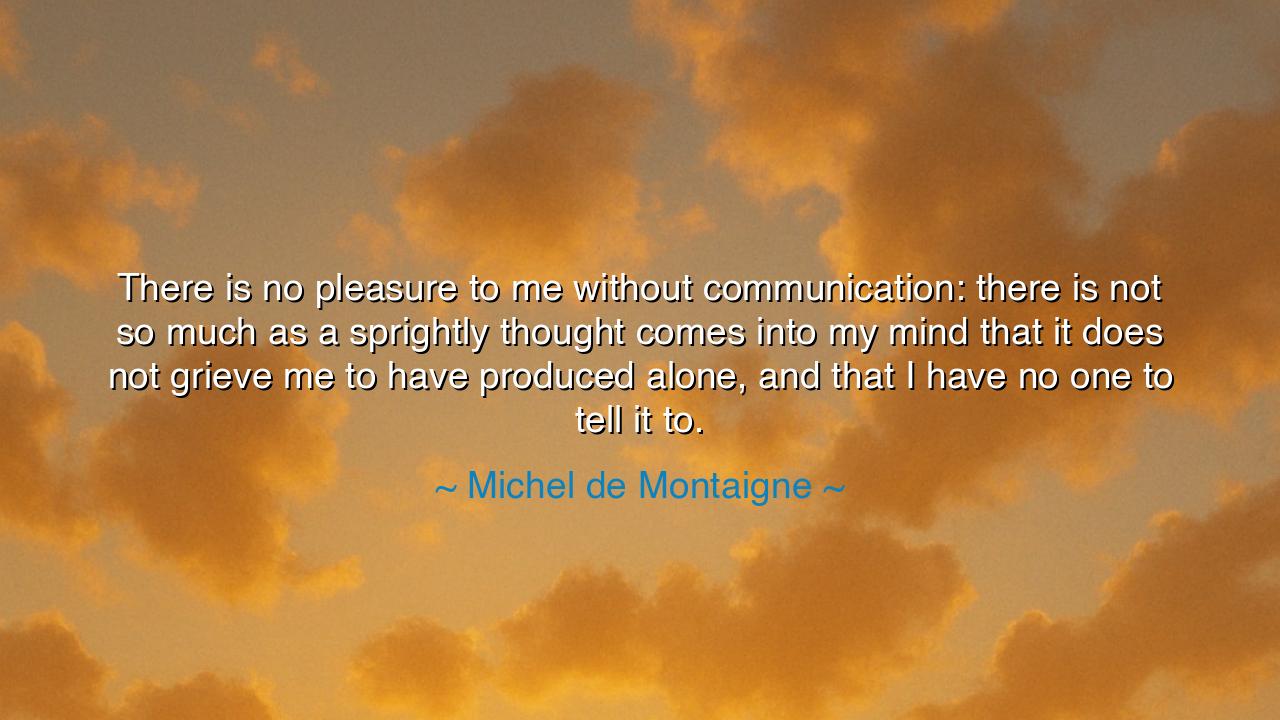
There is no pleasure to me without communication: there is not so
There is no pleasure to me without communication: there is not so much as a sprightly thought comes into my mind that it does not grieve me to have produced alone, and that I have no one to tell it to.






“There is no pleasure to me without communication: there is not so much as a sprightly thought comes into my mind that it does not grieve me to have produced alone, and that I have no one to tell it to.” — these words, spoken by Michel de Montaigne, rise like a warm flame in the dark chambers of solitude. They speak not only of communication, but of the very essence of human connection, the sacred thread that binds one soul to another. Montaigne, the great essayist of France, who sought truth in the mirror of his own heart, confessed that even the brightest thought withers when it cannot be shared. For what is joy, if it echoes only within the walls of one’s own mind?
In this reflection, Montaigne does not merely lament loneliness; he exalts communion—the deep joy of minds meeting, of ideas finding their echo in another heart. He teaches that wisdom, wit, and wonder lose half their beauty when hoarded in silence. The human spirit, after all, was not fashioned to dwell alone in the caverns of thought, but to move among others, to exchange sparks that become the fires of civilization. Like Prometheus who brought flame to mankind, the thinker who speaks shares warmth and light. Without such sharing, even genius grows cold.
History offers us countless witnesses to this truth. Consider the friendship of Socrates and Plato, two souls bound by the search for wisdom. Socrates’ questions would have perished in the air had Plato not listened, learned, and preserved them for eternity. Their dialogues were more than words—they were a communion of minds that birthed the philosophy of the West. Socrates himself might have said, as Montaigne did centuries later, that a thought unshared is a fruit that falls before it ripens. Thus, through dialogue, wisdom becomes immortal.
Even in times of great struggle, the yearning for communication has been the mark of the human heart. When Nelson Mandela was imprisoned for decades on Robben Island, he found solace in conversation—short, whispered, forbidden exchanges through bars or in secret notes passed hand to hand. Each word shared was a reminder that he was still a man, still connected to others, still part of a living spirit that could not be crushed. Without that faint communication, even his noble purpose might have withered. For it is connection that sustains hope.
The wisdom of Montaigne’s words also warns against the pride of isolation. Too many, in their pursuit of knowledge or success, withdraw into themselves, imagining that greatness grows in solitude. Yet Montaigne reminds us that even the finest pearl is meant to be seen, the sweetest fruit to be tasted. A thought that remains unspoken is like music unheard—it exists, but it fulfills no purpose. The joy of expression, of sharing one’s heart with another, is not vanity—it is fulfillment.
Therefore, dear reader, learn to speak, to listen, to share. Do not hoard your ideas, your laughter, or your dreams. Seek those who will understand, who will reflect your light as you reflect theirs. If you are blessed with a spark of inspiration, let it kindle the minds around you. For in that exchange lies both pleasure and immortality.
Let us remember: the world is not changed by silent minds, but by those who dare to communicate their spirit. To think is noble; to share is divine. As Montaigne teaches, no joy is complete until it is multiplied in the heart of another. Therefore, when a bright thought dawns upon your mind, do not let it die in solitude—find a voice, find a listener, and let your soul speak.
For the lesson is simple yet eternal: life’s greatest treasures—wisdom, love, joy—grow only when given. Speak your truth, nurture conversation, and you will never walk in darkness.






AAdministratorAdministrator
Welcome, honored guests. Please leave a comment, we will respond soon